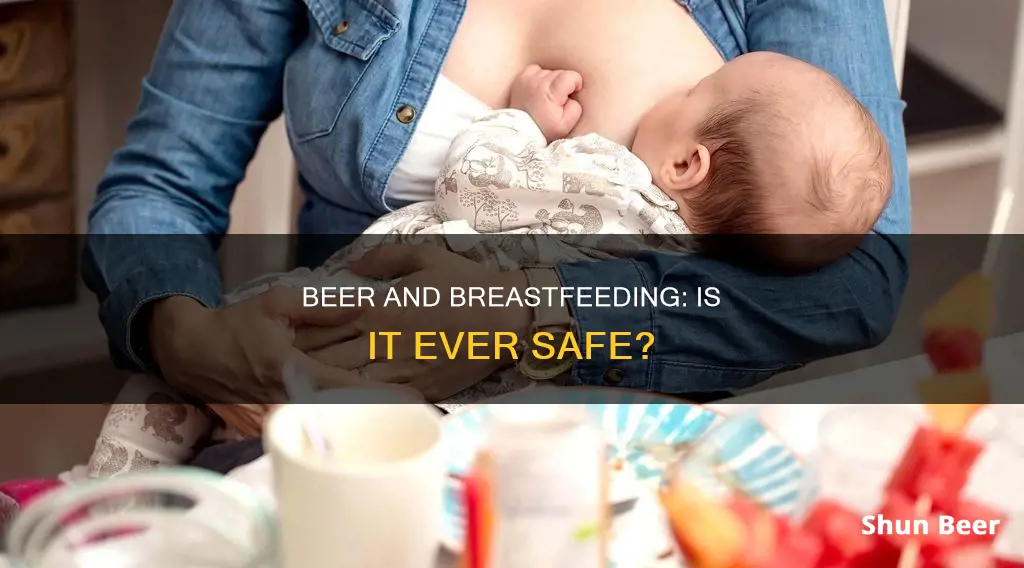
Breastfeeding mothers often wonder if it is safe to nurse after drinking a beer. While it is recommended to abstain from alcohol while breastfeeding, some sources say that drinking in moderation is okay. The American Academy of Pediatrics (AAP) and the Centers for Disease Control and Prevention (CDC) recommend waiting at least two hours after drinking to nurse. This is because alcohol can pass into breast milk and can have negative effects on the baby, such as decreased milk intake, disrupted sleep patterns, and potential long-term harm. However, having one drink a day has not been found to be harmful to the baby, especially if there is a gap of at least two hours between drinking and nursing or pumping.
| Characteristics | Values |
|---|---|
| Is it safe to nurse after drinking a beer? | It is generally considered safe to nurse a baby after drinking a beer, as long as it is an occasional drink and the mother waits at least two hours after drinking to allow the alcohol to leave the breast milk. |
| How long should you wait after drinking a beer before nursing? | It is recommended to wait at least two hours after drinking a beer before nursing a baby, as this is the average amount of time it takes for an adult to metabolize one drink. |
| How much alcohol is safe for a breastfeeding mother to consume? | The general recommendation is to limit alcohol consumption to no more than one drink per day, which is equivalent to 12 ounces of beer (5% alcohol). |
| Does alcohol affect breast milk production? | Regular alcohol consumption can negatively affect breast milk supply and the let-down reflex, which can result in the baby receiving less milk. |
| What are the effects of alcohol on the baby? | Alcohol can cause developmental and neurological problems, trouble gaining weight, disrupted sleep patterns, and delayed motor and cognitive development. |
What You'll Learn

How long after drinking beer is it safe to nurse?
It is recommended that breastfeeding mothers avoid drinking alcohol altogether. However, having an occasional drink is considered safe, provided certain precautions are taken. According to the Centers for Disease Control and Prevention (CDC), moderate alcohol consumption, defined as up to one standard drink per day, is generally considered acceptable.
So, how long after drinking beer is it safe to nurse? Most medical authorities, including the American Academy of Pediatrics (AAP) and the CDC, recommend waiting to nurse for at least two hours after consuming one alcoholic beverage. This guideline is based on the average time it takes for an adult to metabolize one drink. It is important to note that this is a generalized recommendation, and the time it takes for alcohol to leave the breast milk can vary depending on several factors, such as the amount of alcohol consumed, the individual's weight, and how quickly their body metabolizes alcohol.
To ensure the safety of the baby, it is crucial to wait until the alcohol has left the breast milk before nursing. This means that if you have had two drinks, it is advisable to wait for four to five hours before nursing. It is also important to note that drinking alcohol can affect the let-down reflex, which may result in the baby receiving less milk. Additionally, alcohol can cause changes in the taste of breast milk, which may affect the baby's willingness to feed.
If you choose to drink alcohol while breastfeeding, it is recommended to time it right after a nursing or pumping session, ensuring that there is enough time for the alcohol to metabolize before the baby's next feeding. It is also crucial to pay attention to the alcohol content of the beverage, as different drinks have varying alcohol percentages.
A Thirsty Crowd: Beer Consumption Rates
You may want to see also

How much alcohol is safe for a breastfeeding mother?
It is recommended that breastfeeding mothers cut out drinking alcohol completely. However, having an occasional drink is considered safe. According to the Centers for Disease Control and Prevention (CDC), "not drinking alcohol is the safest option for breastfeeding mothers. However, moderate alcohol consumption (up to 1 drink per day) is not known to be harmful to the infant." This is supported by the American Academy of Pediatrics, which recommends that alcohol intake by a breastfeeding mother be occasional and limited to no more than a moderate amount of alcohol at one time.
A moderate amount of alcohol is defined as no more than 0.5 grams of alcohol per kilogram of body weight. For a 60-kilogram mother, this equates to approximately 2 ounces of liquor, 8 ounces of wine, or two beers. It's important to note that the more you drink, the longer it takes for the alcohol to clear your system.
To minimize the amount of alcohol in your breast milk, it is recommended to wait at least two hours after drinking before breastfeeding. This allows your body enough time to metabolize the alcohol. However, it's important to note that this is generalized guidance, and the time it takes for alcohol to leave your breast milk can vary depending on factors such as your weight, how much you drink, how quickly you drink, and whether you consume alcohol with food or on an empty stomach.
Additionally, drinking alcohol can affect your milk supply and let-down reflex, which can result in your baby getting less milk. Research has shown that nursing after a drink or two could decrease your baby's milk intake by 20 to 23 percent.
In conclusion, while occasional and moderate alcohol consumption is generally considered safe for breastfeeding mothers, it is important to time your drinks and allow sufficient time for the alcohol to metabolize before breastfeeding.
Beer and Hep B: Is There a Link?
You may want to see also

What are the effects of alcohol on breast milk?
Alcohol can have several effects on breast milk and the baby consuming it. Firstly, it is important to note that the concentration of alcohol in breast milk closely parallels the mother's blood alcohol level. This means that the more alcohol consumed, the longer it stays in the mother's bloodstream and milk, and the higher the concentration of alcohol in the milk.
The effects of alcohol on the baby are directly related to the amount ingested. While occasional drinking or limiting alcohol intake to one drink per day by the breastfeeding mother has not been proven to be harmful to the baby, daily consumption of more than one drink per day or excessive drinking is likely to negatively impact the baby. This can result in poor weight gain, disrupted sleep patterns, delayed psychomotor and cognitive skills, and possibly impaired immune function and long-term development of reasoning skills.
Additionally, alcohol can affect the mother's milk production and ejection reflex. Studies have shown that alcohol decreases the hormonal response to the baby's sucking, resulting in reduced milk ejection and overall milk supply over time.
To minimise the effects of alcohol on the baby, it is recommended to wait at least two hours after consuming one drink before breastfeeding. This allows the alcohol to metabolise and leave the mother's system and breast milk.
Nuns and Beer: A Curious Combination
You may want to see also

What are the effects of alcohol on the baby?
While occasional drinking is unlikely to harm the baby, regular drinking above the recommended limits can be harmful. The effects of alcohol on the baby depend on how much alcohol the mother consumes and how soon after drinking she breastfeeds.
The more alcohol the mother consumes, the longer it takes for the alcohol to clear her system. Alcohol can be detected in breast milk for about 2-3 hours after one drink, 4-5 hours after two drinks, and 6-8 hours after three drinks. The level of alcohol in the mother's milk closely parallels the level of alcohol in her blood.
If the baby is exposed to a significant amount of alcohol through the mother's milk, they may experience sleep disturbances, including shorter sleep periods, more frequent wakefulness, and less total active and REM sleep. They may also consume less milk, experience impaired immune function, and have delayed motor and cognitive development. In addition, alcohol can affect the mother's milk ejection reflex, resulting in reduced milk supply.
To minimize the effects of alcohol on the baby, it is recommended to wait at least two hours after drinking before breastfeeding. If the mother feels intoxicated, she should wait until she feels completely sober before breastfeeding.
Beer and Dental Fillings: What You Need to Know
You may want to see also

What are the effects of alcohol on the mother?
While there is no evidence of harmful effects on babies when breastfeeding mothers drink no more than one alcoholic drink per day, alcohol can have several effects on the mother. Firstly, alcohol can cause a decrease in the mother's milk supply. This is because alcohol interferes with the hormones oxytocin and prolactin, which are involved in milk production and the milk ejection reflex. Studies have shown that nursing infants consumed less milk in the three-to-four-hour period after mothers consumed a small to moderate amount of alcohol.
Secondly, alcohol can impair a mother's motor skills, reaction times, decision-making skills, judgment, and overall ability to safely care for an infant. If a mother's drinking impairs her ability to care for her baby, she will need to arrange for a sober, responsible adult to take over. Mothers should not co-sleep with their babies if they have been drinking, as this increases the risk of SIDS.
Thirdly, the more alcohol a mother consumes, the longer it takes for the alcohol to clear her system. The blood alcohol level and breast milk alcohol levels are closely correlated, so the amount of alcohol in the mother's milk will be similar to the amount in her blood. The alcohol level in breast milk is usually highest 30 to 60 minutes after drinking. The time it takes for alcohol to leave a mother's system depends on various factors, including the amount of alcohol consumed, the speed of consumption, whether it was consumed with food, the mother's weight, and how quickly her body can metabolize alcohol.
Finally, drinking alcohol while breastfeeding can increase stress and worry for mothers, who may be concerned about the effects of alcohol on their babies.
Jason's Beer Choice: What Was He Drinking?
You may want to see also
Frequently asked questions
It is recommended that alcohol be avoided altogether, but if you are breastfeeding, it is generally considered okay to have an occasional drink. The key is moderation. According to the Centers for Disease Control and Prevention (CDC), moderate alcohol consumption is up to one standard drink per day.
It is recommended to wait at least two hours after drinking before nursing your baby. This is because it takes about two hours for the average adult to metabolize one drink. The alcohol will be out of your breast milk once it's out of your system.
Yes, there are potential risks. Alcohol passes quickly from your bloodstream into your breast milk, so your baby will be exposed to alcohol. Newborns have immature livers and developing brains, which may be more susceptible to the effects of alcohol. Regular exposure to alcohol through breast milk may lead to developmental and neurological problems and trouble gaining weight.







